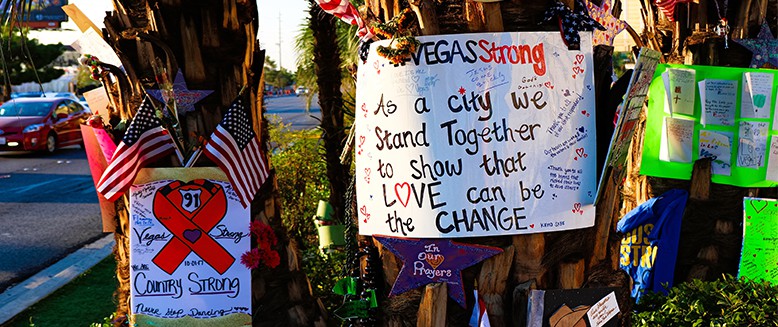PTSD awareness is back on the rise, unfortunately at the horrific cost of the Las Vegas Shooting on Oct. 1. USA Today, CNBC and the Chicago Tribune are among the major news outlets that have focused portions of their coverage of the tragedy on how survivors of the violence, the first responders to the scene and others affected emotionally following the news are now susceptible to varying levels of PTSD symptoms throughout their lives.
PTSD, or Post-Traumatic Stress Disorder, despite being so impactful on mental health and fairly common, is too often misunderstood and/or forgotten. There is tremendous benefit any time wider audiences are made more familiar with the dangerous psychological condition.
They need to know PTSD isn’t strictly related to active military duty and best treated only at veterans hospitals. Any traumatic, stressful event experience (like serious road accidents or violent personal assaults such as sexual assault, mugging or robbery) can trigger symptoms of PTSD for the affected person in the days and weeks following exposure. Some research has suggested that around 30 percent of those affected develop a chronic form that persists throughout their lifetimes.
Also not communicated often enough is how PTSD symptoms are highly treatable. And that forms of treatment are consistently enhanced through research- and initiative-driven modifications.
Treating PTSD through Eye Movement Desensitization and Reprocessing (EMDR) was once a technique that therapists felt self-conscious about — it seemed to look too funny applying it on a patient. Now being certified for EMDR is considered highly covetous in the community of trauma therapists. Cognitive Processing Therapy, originally designed specifically to treat survivors of sexual assault, is now considered common for military personnel experiencing trauma from time in combat and also first responders.
Recognition of PTSD symptoms and their treatment modalities have been among the clinical service enhancements implemented at Northbound through our focus on dual diagnosis care, which provides clients with the customized treatment they need to address their unique addiction and mental health challenges. PTSD symptoms are treated in Northbound’s Trauma Program, which applies certified EMDR assistance and Cognitive Processing Therapy as modalities for specific symptoms along with Psychodrama, Experential Trauma Therapy and Single-Event Trauma Stage Processing.
Thinking about this month’s Las Vegas tragedy in any positive structure is extremely difficult, but greater focus is now being directed toward how PTSD treatment can be extremely valuable to mental health when trauma is acting as a major threat.
References
Sex Differences in Trauma and Posttraumatic Stress Disorder: A Quantitative Review of 25 Years of Research,” David F. Tolin, PhD, Institute of Living and University of Connecticut School of Medicine and Edna B. Foa, PhD, University of Pennsylvania School of Medicine; Psychological Bulletin, Vol. 132, No. 6.
Kozaric-Kovacic D, Kocijan-Hercigonja D. Assessment of posttraumatic stress disorder and comorbidity. Mil Med. 2001;166:78–83.
Interactive Northbound Trauma Program Manager Joanna Filidor used her passion for the neurobiology of trauma as a lens to conceptualize the client care that is now the foundation for the current Resiliency Curriculum all clients use. Learn More
Author
-

President, CEO & Founder at Northbound Treatment Network
Paul Alexander is the CEO, President & Founder of Northbound Treatment Network in Newport Beach, California. He believes wholeheartedly in transformational leadership, organizational health and effective, fully integrated substance use disorder and mental health treatment. With over 27 years of experience in behavioral healthcare, Paul has extensive knowledge of “in vivo” treatment modalities, clinical development, operations, strategy, marketing and financial planning. He has been widely recognized for his development of collegiate-based residential treatment programs for students in recovery and authored a research study at The University of California confirming this modality’s effectiveness.
Paul’s comprehensive professional experience, willingness to innovate, and emphasis on organizational health are vital factors in Northbound’s continued success. Paul received his Certified Addiction Treatment Specialist training at Saddleback College in Mission Viejo, CA, and was awarded Outstanding Alumni Service Award in 2002. Paul holds a Bachelor of Arts degree in Criminology, Law and Society, Summa Cum Laude, from University of California, Irvine, and a Juris Doctorate degree from Loyola Law School of Los Angeles. Paul currently serves on The National Association of Addiction Treatment Providers (NAATP) board. In addition, he serves on The Family Recovery Foundation board and The CarePossible board in Orange County; both organizations are committed to raising funds for family recovery and treatment for former military personnel. Paul is in recovery himself and lives in Orange County with his wife Silvana and his two young sons, Noah and Dean.







